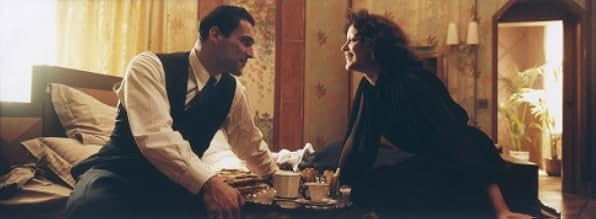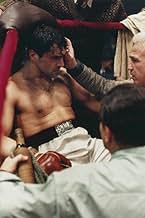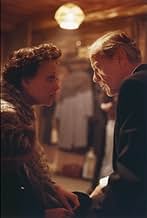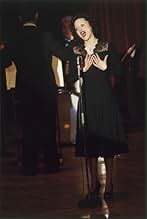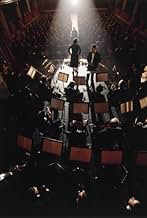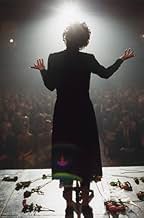Film biografico dell'iconica cantante francese Édith Piaf. Cresciuta dalla nonna in un bordello, è stata scoperta mentre cantava all'angolo di una strada all'età di 19 anni. Malgrado il suo ... Leggi tuttoFilm biografico dell'iconica cantante francese Édith Piaf. Cresciuta dalla nonna in un bordello, è stata scoperta mentre cantava all'angolo di una strada all'età di 19 anni. Malgrado il suo successo, la vita di Piaf era piena di tragedia.Film biografico dell'iconica cantante francese Édith Piaf. Cresciuta dalla nonna in un bordello, è stata scoperta mentre cantava all'angolo di una strada all'età di 19 anni. Malgrado il suo successo, la vita di Piaf era piena di tragedia.
- Regia
- Sceneggiatura
- Star
- Vincitore di 2 Oscar
- 48 vittorie e 61 candidature totali
- Danielle Bonel
- (as Elisabeth Commelin)
Recensioni in evidenza
Title (Brazil): "Piaf – Um Hino ao Amor" ("Paif – A Hymn to Love")
Ultimately it is a film that curiously enough does not come down to acting or story so much as it owes everything to its direction by Olivier Dahan. Audiences have been divided thus far on his efforts as they are somewhat unorthodox, but I believe he has truly done something magical with what could have fallen prey to a by-the-numbers biopic approach. In La Môme, the continuity is clipped and fragmentary at several points in the film, with scene 2 melting into scene 1 as opposed to vice versa. The story of Edith seems to fledge itself around two or three story lines simultaneously her youth, her adulthood and her last days.
Marion Cotillard, a personal favourite of mine, is perfect at each of the aforementioned stages, having met the wonders of realistic make-up but also clearly having connected with the character of Edith Piaf. As a young singer she is fumbling and bird-like, but always with raw intensity behind her performance. As an old lady (although from what I understand she was never truly that old at the time of her death) she has transformed into something else a kind of loud, hysterical diva who is alternatively self-depreciative and overbearing, her youthful humility having been quenched by years of alcohol abuse and her bird-like body and gait having been crippled by rheumatism. Only once does Cotillard vaguely emerge from her character, and it is toward the end when Edith is sitting on a beach in California giving an interview. The rest of the film she is wholly chameleon-like and indistinguishable from la môme.
Certainly this type of tragicomic drama with all of its poverty-stricken episodes and heart-rending tragedies is primed to elicit an emotional response, but Dahan goes the extra mile in polishing the story for audiences. It truly is a beautiful work of art, coated with sweeping tracking shots á la Paul Thomas Anderson or Martin Scorsese blended with shakycam to capture the fast, fickle pace of the business, endlessly creative intercutting of continuity and breathtaking scenes after another. When Piaf's beautiful hands have been noted, a muted performance is given in which the camera only focuses on her theatrics and hand gestures. Yet the best scene takes place in Piaf's apartment some 2/3s into the film in which she is waiting for her lover Marcel to fly in from Morocco. I shall give no spoilers. The film is momentarily gray and depressing, only to jerk the audience away from the misery and lose itself in a blossom-strewn pictorial style whenever Piaf goes on stage.
La Môme is a one-woman-show in all respects, with Cotillard shamelessly relegating every other cast member to the background with her emotional intensity. But in all fairness supporting characters are not given much screen time in the film, seemingly floating away from the central story eventually, or dying in some tragedy, illustrating the lonely life of its titular singer. La Môme needs to be seen to be believed, for it unexpectedly floors all other musical biopics of recent years or indeed ever.
9 out of 10
One thing about the movie that annoyed me a little was the switches of time frames. I understand the purpose of it. During the first 15 minutes we get to see the sickly little girl, then Edith Piaf's days of glory and' finally, her last days, when she was a tortured creature and looked like a 70-year old woman. So even while living through the singer's happiest days we never forget how it would end quite soon. But sometimes these switches seem unnecessary and distracting. The other flaw is that a viewer must be well-familiar with the singer's biography, otherwise it would be difficult for one to understand certain moments in the film.
I don't have much to say about the director's masterful work, honestly there is none. The director had the story of life, he had the music and the haunting voice of the great singer. The latter is what makes most of the emotional impact. But I would recommend this movie sincerely, Marion Cotillard's acting alone would make it worth watching, and there are other beautiful things in it as well. The movie never seems too long, and its last minutes are very emotional, when Edith Piaf is led to the stage, she can hardly walk, and then she starts to sing 'No regrets' and transforms completely.
After a very tasty $7 lunch of 'stew chicken with rice & beans' and a portion of fried plantains, I headed on up 8th Avenue. A few blocks further on I came to a cinema and decided that it would be great to see a 'movie' on a real big screen rather than the way I see most films these days through the distinctly low-def screen built into the back of the airline seat in front of me.
I was just in time to buy tickets for La Vie en Rose which was starting right away. Entering the big 'movie theater' I was shocked that at four on a Wednesday afternoon the place was packed solid. As my eyes adjusted and hunted for an empty seat I observed that I was once again the stranger - almost everyone there appeared to be over sixty. Perhaps it was the cheap day for seniors or the fact that La Vie en Rose had only opened a few days earlier but the film definitely merits a large audience.
Perhaps you are put off by foreign language films with subtitles, but to have dubbed this from French would have been a crime. It is a biopic of the life of Edith Piaf whose theme song was La Vie en Rose - literally 'Life in Pink' or more idiomatically 'The Rose-tinted Life'. Edith Piaf's gravelly voice and melodramatic life is superbly portrayed by Marion Cotillard as the film works its way through her life to the accompaniment of her distinctive songs. Of course, as in all French films which make it to the anglophone world, there is a role for THE French Actor as we often refer to Gerard Depardieu; he is the impresario who literally discovers 'the Little Sparrow' singing in the back-streets of Montmartre.
It was quite a puzzle to place each scene in chronological order as the film jumps around through more flashbacks and flash forwards than an entire season of Lost. Apart from that though, La Vie en Rose is an absolute triumph, rich with the colours of Piaf's tragic life. The entire audience stuffed damp handkerchiefs into their pockets, rose to their feet and applauded this guaranteed Oscar winner. Piaf finished her career singing a song which she felt summed up her life - "Non je ne regrette rien!" Take your friends to see this classic film and you'll have no regrets either.
Lo sapevi?
- QuizMarion Cotillard is one of only six actors to have won an Academy Award for a role spoken mainly in a non-English language. Sophia Loren, Robert De Niro, Benicio Del Toro, Roberto Benigni and Christoph Waltz are the other five.
- BlooperJust before a young soldier plays a song for Edith in her apartment, a supertitle reads "February 1940." An issue of "Paris Match," first published in 1949, is on the coffee table.
- Citazioni
American journalist: If you were to give advice to a woman, what would it be?
Edith Piaf: Love.
American journalist: To a young girl?
Edith Piaf: Love.
American journalist: To a child?
Edith Piaf: Love.
- ConnessioniFeatured in Smagsdommerne: Episodio #5.11 (2007)
I più visti
Dettagli
- Data di uscita
- Paesi di origine
- Lingue
- Celebre anche come
- Çəhrayı rəngdə həyat
- Luoghi delle riprese
- Praga, Repubblica Ceca(scenes supposed to take place in Paris in the 1950s)
- Aziende produttrici
- Vedi altri crediti dell’azienda su IMDbPro
Botteghino
- Budget
- 25.000.000 USD (previsto)
- Lordo Stati Uniti e Canada
- 10.301.706 USD
- Fine settimana di apertura Stati Uniti e Canada
- 179.848 USD
- 10 giu 2007
- Lordo in tutto il mondo
- 87.485.236 USD
- Tempo di esecuzione2 ore 20 minuti
- Colore
- Mix di suoni
- Proporzioni
- 2.35 : 1
Contribuisci a questa pagina






